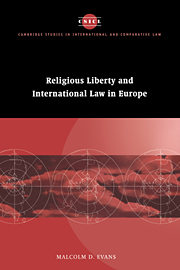Book contents
- Frontmatter
- Contents
- Acknowledgments
- Chronological table of international treaties
- Table of cases
- List of abbreviations
- Introduction
- 1 Early antecedents
- 2 From Augsburg to Paris
- 3 The League of Nations: drafting the Covenant
- 4 The Polish Minorities Treaty
- 5 The extension of the minorities system
- 6 The experience under the League
- 7 The UN system
- 8 Article 18 of the International Covenant on Civil and Political Rights
- 9 The 1981 Declaration on the Elimination of All Forms of Intolerance and of Discrimination Based on Religion or Belief
- 10 Religious freedom under the European Convention on Human Rights: the drafting of Article 9 and of Article 2 of the First Protocol
- 11 The application of Article 9 of the European Convention on Human Rights
- 12 Restrictions upon the scope of Article 9(1)
- 13 The application of Article 2 of the First Protocol
- 14 An interim conclusion
- Bibliography
- Index
- CAMBRIDGE STUDIES IN INTERNATIONAL AND COMPARATIVE LAW
6 - The experience under the League
Published online by Cambridge University Press: 06 January 2010
- Frontmatter
- Contents
- Acknowledgments
- Chronological table of international treaties
- Table of cases
- List of abbreviations
- Introduction
- 1 Early antecedents
- 2 From Augsburg to Paris
- 3 The League of Nations: drafting the Covenant
- 4 The Polish Minorities Treaty
- 5 The extension of the minorities system
- 6 The experience under the League
- 7 The UN system
- 8 Article 18 of the International Covenant on Civil and Political Rights
- 9 The 1981 Declaration on the Elimination of All Forms of Intolerance and of Discrimination Based on Religion or Belief
- 10 Religious freedom under the European Convention on Human Rights: the drafting of Article 9 and of Article 2 of the First Protocol
- 11 The application of Article 9 of the European Convention on Human Rights
- 12 Restrictions upon the scope of Article 9(1)
- 13 The application of Article 2 of the First Protocol
- 14 An interim conclusion
- Bibliography
- Index
- CAMBRIDGE STUDIES IN INTERNATIONAL AND COMPARATIVE LAW
Summary
The scope of protection
The previous chapters have chronicled the development of the minorities system. All of the instruments shared a common framework which had four basic components: clauses relating to nationality; to equality of rights; general measures concerning minorities; and, where appropriate, specific measures for particular minority groups. The nationality provisions varied in length and detail according to the States concerned and need not be given any further consideration. The ‘equality’ clauses were standard, varied only in the Albanian Declaration and the Treaty of Lausanne, as were the general minorities clauses. The special minorities clauses comprised the ‘Jewish articles’ of the Polish Treaty which were either combined with, or replaced by, other particular measures of protection as considered appropriate. Thus religious issues were embraced by this general scheme in a number of ways and the Polish Treaty will be used as a model to demonstrate this.
The ‘equality’ clauses operated in different fashions. First, Article 2 of the Polish Treaty provided an undertaking to: ‘assure full and complete protection of life and liberty to all inhabitants of Poland without distinction of birth, nationality, language, race or religion’. To this general provision was added the specific obligation that: ‘All inhabitants of Poland shall be entitled to the free exercise, whether public or private, of any creed, religion or belief, whose practices are not inconsistent with public order or public morals’.
- Type
- Chapter
- Information
- Religious Liberty and International Law in Europe , pp. 145 - 171Publisher: Cambridge University PressPrint publication year: 1997

